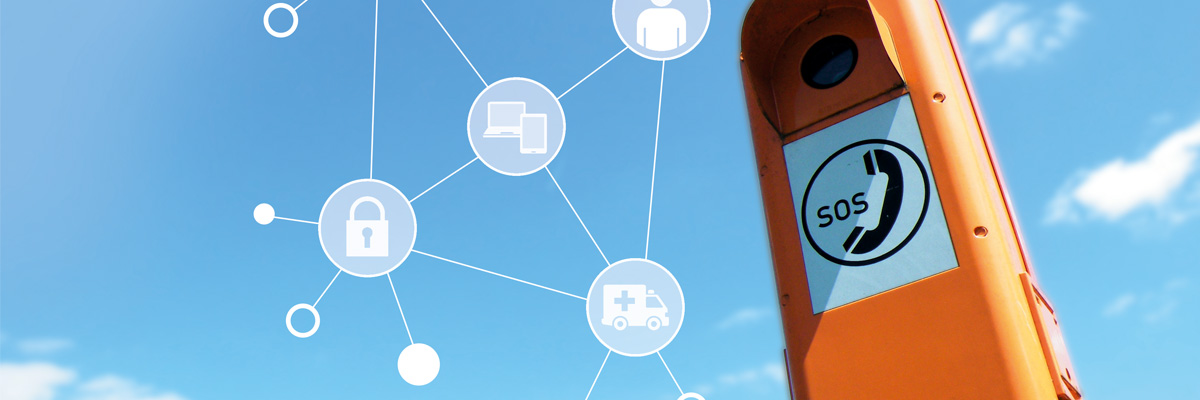A head start through location- and time-dependent information
In the public perception, the broad field of logistics is often limited to the supply of goods - the right goods, at the right time, at the right place. In many areas of logistics, however, a completely different aspect is increasingly playing a much more decisive role, namely the right information - on which safety and security logistics is also based. The enormous future potential of (safety and security) logistics is mainly due to the growing integration of modern information and communication technologies (ICT).
Information logistics therefore deals with the efficient use of these modern technologies in all subject areas of logistics. The acquisition of safety-critical, location- and time-dependent data as well as their automated processing into usable real-time information represent the central aspects of safety logistics.
Challenges
The complexity of our everyday lives resulting from the increasing amount of available data poses an enormous challenge to information logistics. For while the acquisition of specific data and information, for example by means of positioning technologies and sensor technology, is becoming increasingly simple, flexible, faster and also more cost-effective, the fusion and evaluation of the data into information that can be used by man and machine is a time-consuming affair. Another challenge is the large number of currently existing systems between which the data and information transfer is to take place reliably. The multitude of different software and hardware makes the development of cross-system applications difficult and causes a considerable dependence of the respective functionalities on the system requirements of the user.
In the area of personal safety or the support of emergency forces, specific applications or individually realised concepts must, on the one hand, include numerous uncertainty factors, and on the other hand, they must provide those responsible with concrete recommendations for action as well as clear and reliable results. But the increasing complexity of processes also poses an enormous challenge in the area of goods. Particularly in the case of hazardous goods, accidents can lead to considerable environmental and health damage.
Technical foundations
The basis of numerous applications is location-dependent data, which is processed situation-specifically by means of the most modern information technologies. The processing takes place, for example, in the form of applications for mobile devices, web services or also in the form of an up-to-date, geo-referenced situation display of the real-time positions of people and goods. Information technology and geo-referenced data transmission also play a key role in the optimisation of existing processes, computer-assisted simulation to derive optimal procedures and concepts, or in monitoring current measured values from a distance (e.g. temperature, vital signs). In addition, the processing of existing data sets (sensor data fusion), for example for the creation of preventive safety concepts by means of preventive safety concepts by means of simulations and projections, is based on the growing potential of ICT technologies.
Fraunhofer IML can build on numerous experiences and successfully designed and implemented applications in this field, but especially in the field of information and positioning technologies. Especially the combination of several satellite navigation systems (GPS, GLONASS, Galileo) is a frequent component of our work and research.
Our competences
In addition to technological expertise and many years of experience in project management and project leadership, the Fraunhofer IML, Project Center "Traffic, Mobility and Environment", in Prien am Chiemsee has, among other things, the methodological competence to carry out independent studies, market and potential analyses, to carry out and evaluate device & system tests, as well as within concept development, requirements coordination and analysis.
The Information, Safety and Security Logistics division focuses on the following key areas:
Application of ICT technologies
• Precise localisation and tracking
• Use of multi-GNSS and sensor technology
• Mobile satellite navigation applications
• Concepts for intelligent positioning and navigation systems
• Use of satellite-based technologies and services
• Use of mobile terminals
Consulting and concepts for public service providers
• Mission management and optimisation
• Efficient resource management and operational process improvements
• Civil security
• Use of real-time information and sensor data
• Digitalisation in the security sector
• Incorporation of robotics
• Rescue force support
Concepts for security in traffic
• Information systems with local reference
• Automation in transport and traffic
• Information management for the transport of dangerous goods
• Increased road safety through the use of specific ICT technologies and networked systems
• Mobile telematics systems for logistics and transport
• Digitalisation in the transport sector
• Intelligent emergency call systems
 Fraunhofer Institute for Material Flow and Logistics IML
Fraunhofer Institute for Material Flow and Logistics IML